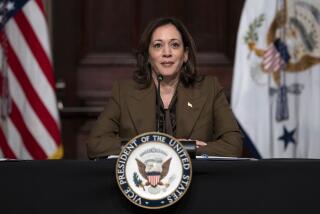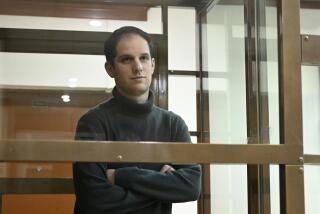Gorbachev Balks at Reagan Invitation
MOSCOW — Secretary of State George P. Shultz delivered a new invitation from President Reagan for Soviet leader Mikhail S. Gorbachev to go to Washington for a superpower summit this year, but Gorbachev told reporters that “generally, without reason, I do not go anywhere, particularly America.”
Shultz met Gorbachev, along with their senior advisers, in Catherine’s Hall in the Grand Kremlin Palace against the background of a bitter public exchange between the superpowers on spy charges.
“This cannot be just a stroll,” Gorbachev said as he again stressed that a summit should produce solid results.
Later, the Soviet news agency Tass reported that Gorbachev was willing to visit Washington “to conclude a treaty on missiles.”
A senior U.S. official, in a post-midnight briefing, refused to say whether the session produced any progress. He said, however, that “the summit was not a central issue.”
Shultz met also with Premier Nikolai I. Ryzhkov and Foreign Minister Eduard A. Shevardnadze--a total of nearly 10 hours with senior Soviet officials. Shultz had four separate meetings with his staff.
In a downbeat report at the end of Shultz’s busy day, Tass said, “The U.S. leadership is practically unprepared to act vigorously, to go its part of the way” to improve superpower relations.
Before sitting down with the Soviet leader, Shultz handed him a new invitation from Reagan for a summit in Washington.
Gorbachev, 56, has steadfastly resisted Reagan’s invitation, even though the two leaders decided at their 1985 meeting in Geneva to hold summits in both Washington and Moscow.
“You’re welcome to come,” Shultz said. “I have a letter from the President, and it says so.”
As the two men shook hands under gilded chandeliers, a reporter asked Gorbachev if he would go to Washington this year.
Shultz stood impassively as Gorbachev made his comments about the possibility of a visit, adding, “Well, I think I have to be hopeful, and it just cannot be that I would avoid America in my travels.”
Gesturing toward Shultz, the Soviet leader said with a small smile, “And the secretary of state keeps silent.”
At that point, Shultz pulled Reagan’s letter from his pocket and handed it to Gorbachev. The two men and a few advisers then sat down on opposite sides of a long table.
Gorbachev turned Reagan’s letter over to Shevardnadze, and the foreign minister apparently passed it to Anatoly F. Dobrynin, who was ambassador to Washington for a quarter-century and now is a secretary of the Communist Party Central Committee.
Gently needling the Soviet leader, Shultz said: “I don’t want to interfere in your internal affairs, but giving him a letter the President wrote to you. . . .”
Gorbachev interjected, “He hasn’t yet forgotten being an ambassador, when everything was done through him.”
Early Tuesday evening, Shultz took time out from the talks to host an ice cream social at the U.S. Embassy here, where morale has plummeted because of the spy-for-sex scandal involving members of the U.S. Marine security contingent. He and his wife Helena helped serve the hundreds of embassy officials and their families.
“For a while,” he said, “my wife and I will serve the ice cream because it’s about time someone served you rather than the other way around.”
He praised the diplomats for “helping to manage this extraordinarily important relationship (with the Soviet Union) in a way that lends to our country and to the world as great a measure of stability as possible.”
More to Read
Sign up for Essential California
The most important California stories and recommendations in your inbox every morning.
You may occasionally receive promotional content from the Los Angeles Times.










